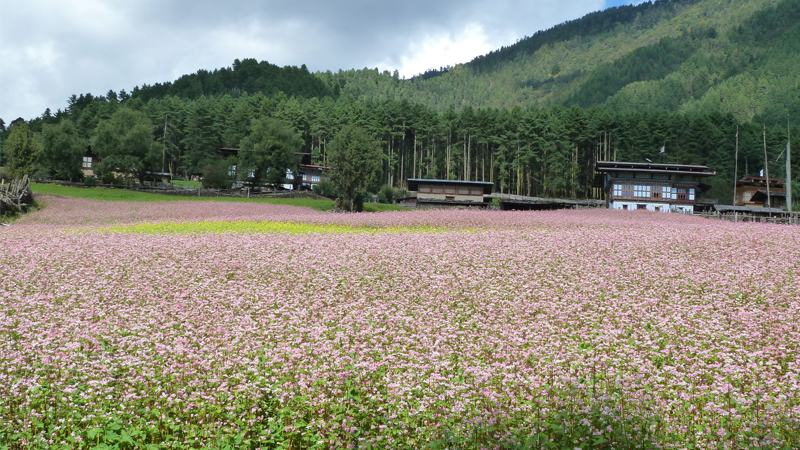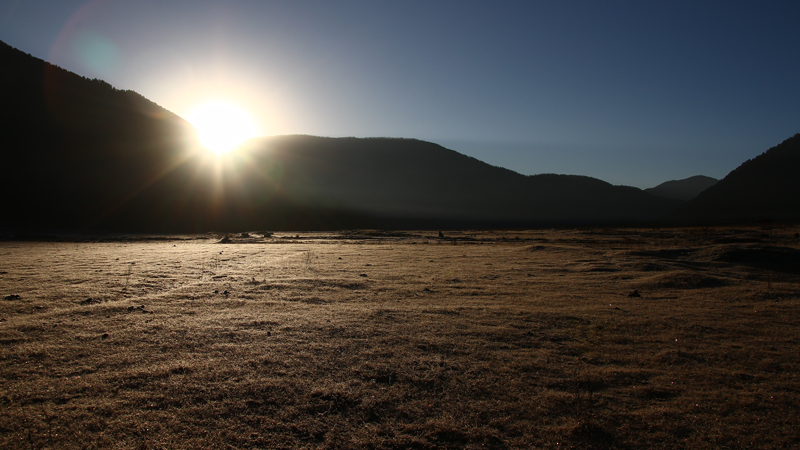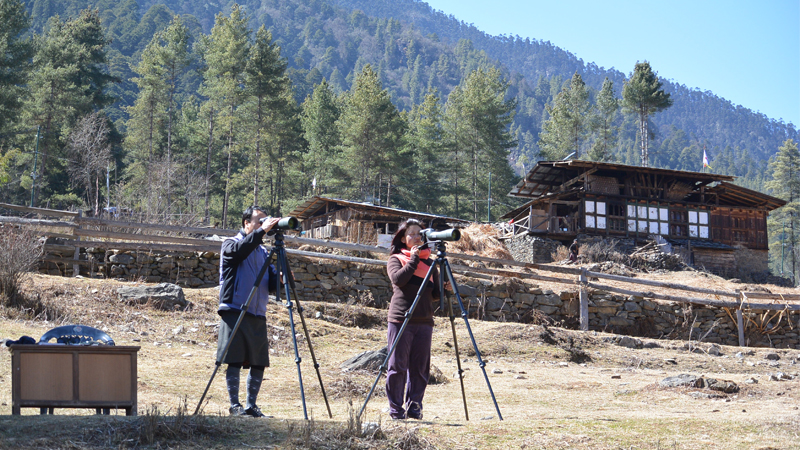For Support? Call Us: +97517909001 / +97577343951
bhutansacredhills@gmail.com / sacredhillsadventure@gmail.com
12 Nights
13 Days
Duration:13 days Entry: Paro, western Bhutan Exit:Guwahati, Assam, India Best seasons: March-May, September-November
Landscape, culture, people, flora, fauna, spectacular views of the world’s highest mountains, mind-boggling gorges, waterfalls and other wondrous manifestations of nature.
Among thousands of flowers which carpet the mountainsides in spring, it has more than 55 different varieties of rhododendron alone and about 500 species of orchids. This tiny country has over 700 species of birds, more than the whole of North America.
Day 1: Bangkok/New Delhi/Kathmandu-Paro
Get a seat on the left side of the aircraft; keep your camera ready (battery charged, of course), and follow the instructions of the pilot as he/she guides you through the world’s highest mountains, one after another – Kanchenjunga, Everest, Lhotse, etc. On a clear day, the views are nothing short of spectacular.
Get a bird’s view of Paro International Airport, a black strip in a narrow valley that is considered to be among the world’s 10 most challenging airports. Here on, you have entered the “dreamland”, so to speak, for photography.
Day 2: Paro
Get a seat on the left side of the aircraft; keep your camera ready (battery charged, of course), and follow the instructions of the pilot as he/she guides you through the world’s highest mountains, one after another – Kanchenjunga, Everest, Lhotse, etc. On a clear day, the views are nothing short of spectacular.
Get a bird’s view of Paro International Airport, a black strip in a narrow valley that is considered to be among the world’s 10 most challenging airports. Here on, you have entered the “dreamland”, so to speak, for photography.
Day 2: Paro
- Rinpung Dzong (Fortress on a Heap of Jewels), National Museum, 7th century Kyichu Temple among several other ancient religious monuments and sites
- The ruins of Drugyal Dzong and Taktshang (Tiger’s Lair) Monastery, famed for its religious significance and architectural wonder
- Chelela Pass (3,988 meters) and from there stunning views of Mt Jomolhari (7,326 meters) which is revered as the Abode of Goddess Remati. Also, numerous species of alpine flowers, and birds like Himalayan Monal, Satyr Tragopan, and Kalij Pheasant
Day 3 & 4: Thimphu
Thimphu is Bhutan in a miniature. There are places that no photographer should miss. These include:
- Tashichhodzong – the magnificent 500-year old seat of Bhutan’s governance and the palace/office of the king.
- Parliament Building – An epitome of modern Bhutanese architecture combined with traditional grandeur.
- Buddha – the world’s biggest Buddha built on the breast of a hillock which commands a spectacular view of the capital city.
- Sangaygang– The perfect viewpoint for Thimphu city.
- Memorial Stupa – the most beautiful stupa in Bhutan built in memory of the father of modern Bhutan, king Jigme Dorji Wangchuck
- Vegetable Market – For people and culture
- Norzin Lam (street) – The busiest place in the capital
- Textile Museum, Folk Heritage Museum, School of Art and Craft
Day 5 – Thimphu-Punakha/Wangdue
- Semtokha Dzong, the oldest monastery fortress of Bhutan.
- Dochula, the 3,116 meter pass which provides a breathtaking view of the higher Himalayas
- Vegetation from alpine to the sub-tropical, rare birds and flowers
- The Wangdue-Punakha valley, farms and villages, ancient monasteries including Chimi Lhakhang (the Temple of Fertility)
- Punakha Dzong, the old capital of Bhutan and Bhutan’s most prized asset
- The ruins of Wangdue monastery-fortress
- The area is the habitat of White-Bellied Heron, the world’s rarest bird.
Day 6 – Punakha/Wangdue – Trongsa
- Verdant forests, rare birds (including the exotic black-necked crane) and animals, and beautiful alpine flowers.
- Pelela pass (3,390 meters), the Black Mountain range, hamlets along the way.
- 18th century stupa at Chendebji
- View of Trongsa Dzong – the monastery fortress which is one of the biggest in Bhutan and traditionally the power centre of central-east Bhutan.
- The Watch Tower of Trongsa
- Trongsa town.
Day 7: Trongsa – Bumthang
- Views of Mangde valley
- Yotongla pass (3,400 meters)
- Bumthang valley, one of the most beautiful in Bhutan, filled with old palaces, historical and religious monuments.
Day 8: Bumthang
- Jakar Dzong (Castle of the White Bird)
- Wangdicholing Palace and Domkhar Palace
- The famous Kurjey Temple and 7th century Jambay Lhakhang (temple)
- Tamzhing Monastery, and the legendary Mebartsho (Burning Lake)
- Airstrip, villages, nature trails, towns, etc.
Day 9: Bumthang – Mongar
- Thrumshingla National Park and the Thrumshingla Pass (3,780 meters)
- Sengor-Yongkala-Lingmithang area, which is known as the Birding Capital of the World. Has the world’s highest density of birds, including some of the most rare and exotic.
- Ruins of Zhongar Fortress
- Kurichu Hydroelectric Dam and power house
- Lingmethang and Mongar towns
Day 10: Mongar-Trashigang
- Korila Pass and the surrounding views of the landscape of eastern Bhutan
- Yadi zig, and shots of the valley carved by Dangmechu, the biggest river of Bhutan
- Gomphu Kora, a great site of pilgrimage for Buddhists
- Trashigang Dzong, historically the powerhouse of the regional ruler
- Trashigang and Rangjung towns
- North Trashigang, the most populated area of Bhutan – local culture, customs, traditions, lifestyle
Day 11: Trashigang
- North Trashigang, the most populated area of Bhutan and the centre of local culture, customs, traditions, lifestyle
- Folk festival, dance and music
Day 12: Trashigang - Samdrup Jongkhar
- Dozens of villages along the way.
- Sherubtse College (Bhutan’s first), Yonphula airstrip, and the adjoining views.
- Numerous ancient temples and monasteries enroute
- Ancient iron smithy at Barshong
- Bird watching area at Moshi, Dewathang
Day 13: Samdrup Jongkhar – Guwahati airport for onward flight.



